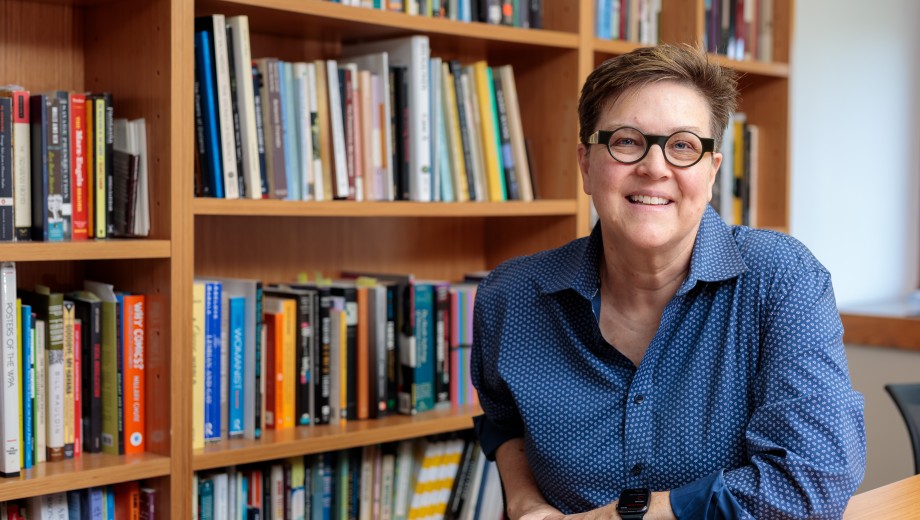On July 1, Deborah L. Nelson, the Helen B. and Frank L. Sulzberger Professor of English, became dean of the Division of the Humanities. She has spent her entire career at the University of Chicago, arriving in 1996. Nelson has served as chair of English Language and Literature, deputy provost for graduate education, and director of the Center for the Study of Gender and Sexuality. Her thought-provoking book Tough Enough: Arbus, Arendt, Didion, McCarthy, Sontag, Weil (University of Chicago Press, 2017) won the Modern Language Association’s James Russell Lowell Prize for Best Book of 2017 and the Gordon J. Laing Award in 2019 for the most distinguished contribution to the University of Chicago Press by a UChicago faculty member.
Questions in italics are exclusive to this online story and do not appear in print.
How do you think being dean will differ from being chair of the English Department?
Obviously, the scale is quite different, and I will be much more engaged with alumni and donors. What excites me is working across the division to help build ambitious research and teaching projects.
I would also like to nurture the relationship between the arts and the humanities, which is uniquely intense at the University of Chicago. Our arts programs are led by groundbreaking faculty who have propelled interest in art-making among the undergraduates. For English and Creative Writing, the dialogue between scholars and practitioners has elevated both.
What are a few things that you have learned from your colleagues and students at UChicago?
You cannot go wrong with UChicago colleagues and students. Every day faculty members and students become more interesting, exciting, and collaborative.
My colleagues have been tremendous mentors by reading and commenting on books in progress. Even more important, they have helped me to do the kind of scholarship I want to do and have not tried to change me. After I received tenure at UChicago, I formed a group with my new peers to work on our second books. It’s tough for most academics to write their second book. The first book often comes from their dissertation topic. I was fortunate because my second book, Tough Enough, seemed to resonate after the failure of Hillary Clinton’s presidential campaign and found a wide audience.
I am always learning from UChicago students—both graduate and undergraduate. It is such a privilege to read their new research and realize new discoveries through their work. In this way, my own scholarship is constantly being expanded.
How do you like living in Chicago?
I was born in Detroit. Since my father was a salesman, we moved every two years. Finally, we ended up on the East Coast in Connecticut, which is where my parents wanted to be. I earned my PhD in English from the City University of New York. When UChicago hired me, the city of Chicago was unknown to me. Now I’ve lived in this city longer than any single place in my life. I love Chicago because of its great art, wonderful selection of good restaurants, and lively theater culture. I’ve made lots of friends, and I am fascinated by what makes this large city work and not work.
What do you think makes UChicago a distinctive place to conduct research and teach?
Students and faculty share a passion for ideas, which makes it lively and engaging. The biggest problem is being crushed by all you want to do. There is way too much going on, so you must pace yourself.
I have worked collaboratively with several faculty members, including historian Jim Sparrow, sociologist Kristen Schilt, and political scientist Cathy Cohen. UChicago offers so many opportunities for intellectual collaboration. We also have strong support such as research leaves, access to the great UChicago library, and funds to travel. It is so important for my work to go to original archives to find the best materials for research. All my best ideas come in the archive.
What is your current research project?
I am working on a book about the 1940s and the aftermath of World War II, when there was a turn toward realism—theological, moral, and literary—as a safeguard for our collective life. One chapter is on literary philosopher Erich Auerbach and film critic André Bazin, who had similar approaches to realism in their respective fields. I expect to write about other luminaries during this time, such as George Orwell, Hannah Arendt, Simone Weil, Paul Tillich, and Albert Camus.
What are you reading for fun?
The last book that I read was Kafka on the Shore by Haruki Murakami.
Does listening count? When I drive my son and daughter to school and activities, I listen to audiobooks on many topics. Recently, I listened to the complete works of Jane Austen. Every sentence in her work is perfect. I really understood that better with my ear than with my eye.

